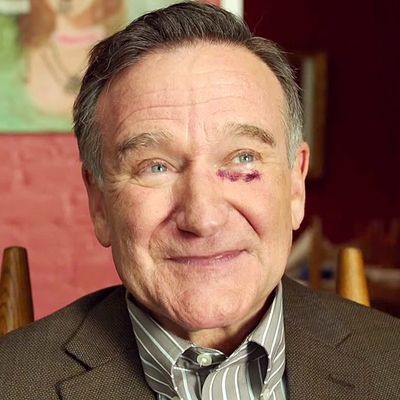
Watching Boulevard, I realized it had been some time since I’d really had a chance to focus on Robin Williams’s face. I’d obviously seen it plenty of times, but so often the late star’s rapid-fire speech was the main attraction. I recently had to watch The Fisher King repeatedly, for weeks on end (don’t worry, it was for an article) and found myself fixating on Williams’s physicality; his sweeping, childlike gestures; and yes, his rat-tat-tat delivery — sometimes improvised, always a whirlwind. But so rarely was he at rest; the face, familiar though it was, often got lost. (We should note, however, that the tense, quiet thriller One-Hour Photo, in which Williams gave one of his best performances, was one exception.)
Boulevard, the last time we will ever see Robin Williams in a new film, gives us a chance to regard that face anew. Williams has thoroughly internalized his performance as a middle-aged, married man discovering that he’s gay. Gone is the fast talk — here, when words come out of his mouth, they come out awkwardly, timidly. And gone are the broad, fast movements — this is someone cornered by life, who has trouble even looking at other people, let alone moving toward them. Instead, the camera stays resolutely close on the actor. And before us, we see an aging, broken man. Did he always look like this? I asked myself as I watched the film. Or is that something he’s actually doing for the part? It’s a transformation, to be sure. Without his patented speech, without that nervous but wide smile, Williams becomes something else, something mesmerizing and sad.
Williams plays Nolan Mack, an unremarkable man living an unremarkable life, working as a loan officer at a local bank, taking care of his dying father and demurely kissing his wife Joy (Kathy Baker, who is excellent here) good-bye every morning. One night, returning from seeing his father at the hospital, he pulls alongside a street full of prostitutes and almost runs over a young man named Leo (Roberto Aguire). Not exactly a meet-cute — “I have a fear of hurting people,” Nolan says, ostensibly speaking about the near-accident but also clearly talking about his life — but he’ll take it: Nolan and Leo soon develop a thing, one founded not so much on sex as on the older man’s need for companionship. When they go to a hotel, Nolan stands in the corner awkwardly making coffee while Leo, visible as a reflection on the TV screen, undresses; it all seems very unreal.
There are interesting bits of backstory along the way: Nolan’s best friend Winston (Bob Odenkirk), an academic with a thing for co-eds, speaks of how the two of them were planning to move to New York after college: “Winston and Nolan, taking on the Big Apple. I was gonna write the great American novel. You were gonna pay our rent, working on Madison Avenue, selling underpants to anyone who’d buy them.” It’s meant to be a wistful, youthful memory of two best buds, but it almost sounds like a marriage, and we wonder if it meant something more to Nolan. Especially when Winston adds, “But then, you found Joy — literally.”
Most of the story’s other alleyways you can see coming — there’s a subplot with Leo’s pimp that feels airlifted in from a different movie. The most surprising thing here might be that Boulevard doesn’t overtly present itself as a narrative of liberation — Nolan isn’t suddenly giddy and free as a result of his realization, but rather conflicted and depressed in a different way, wary of hurting the woman he still loves. So the emotions are complicated; the film is anything but. Director Dito Montiel and screenwriter Douglas Soesbe seem to understand the value of simplicity. For much of the film, we’re watching Nolan reacting, or Nolan driving, or Nolan looking. They let the movie play out on Williams’s face — a risky move, given that the actor in his later years had struggled to really shine in a part. But here, it works. Boulevard is a sad, hesitant little movie about a sad, hesitant little man. That may be a far cry from the Robin Williams roles we knew and loved, but it’s not a bad one on which to go out.





